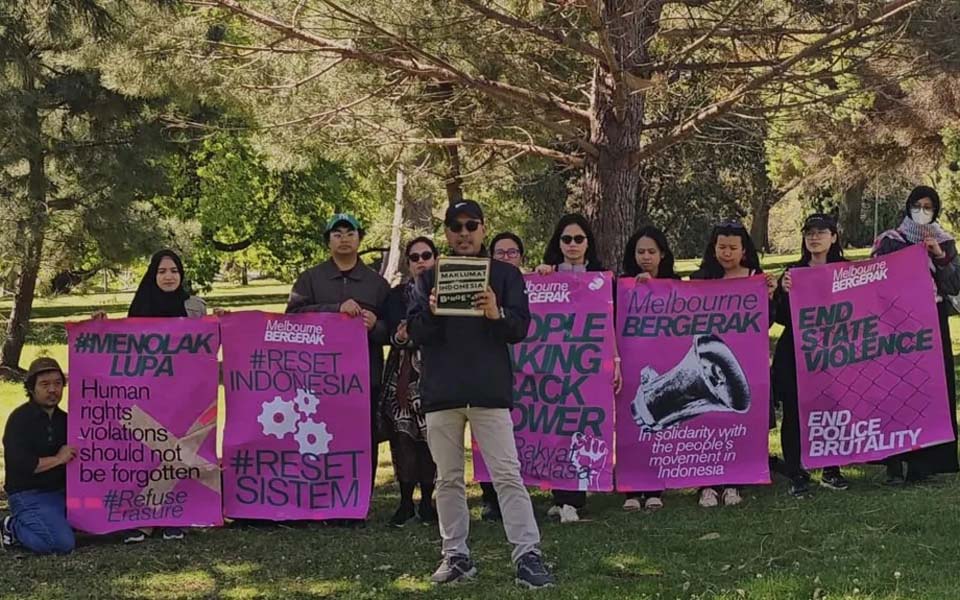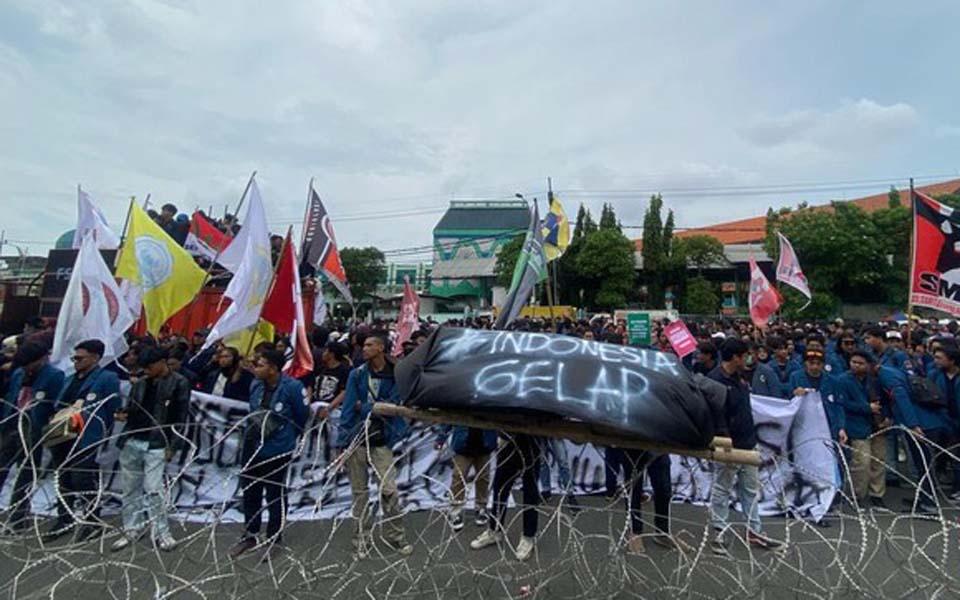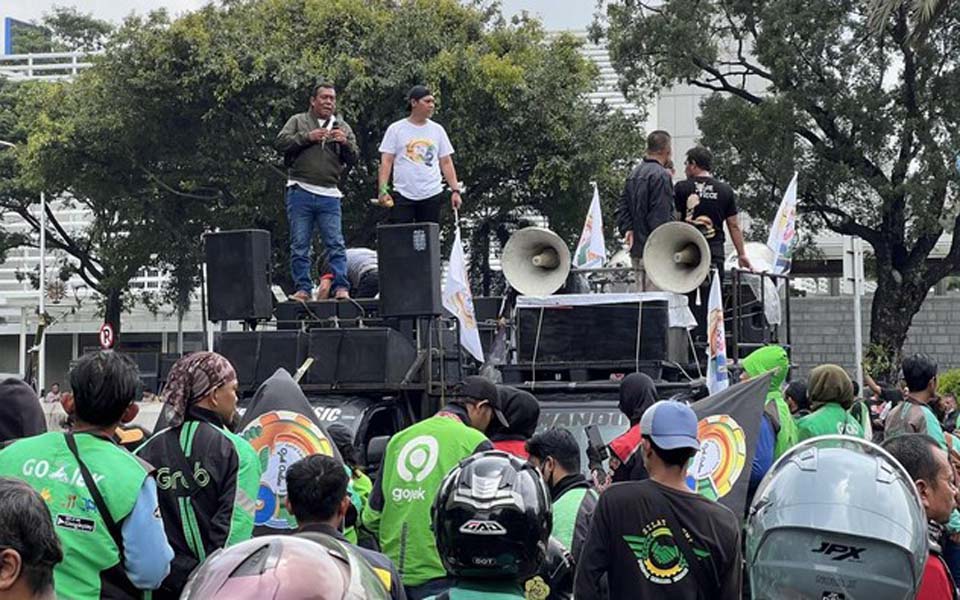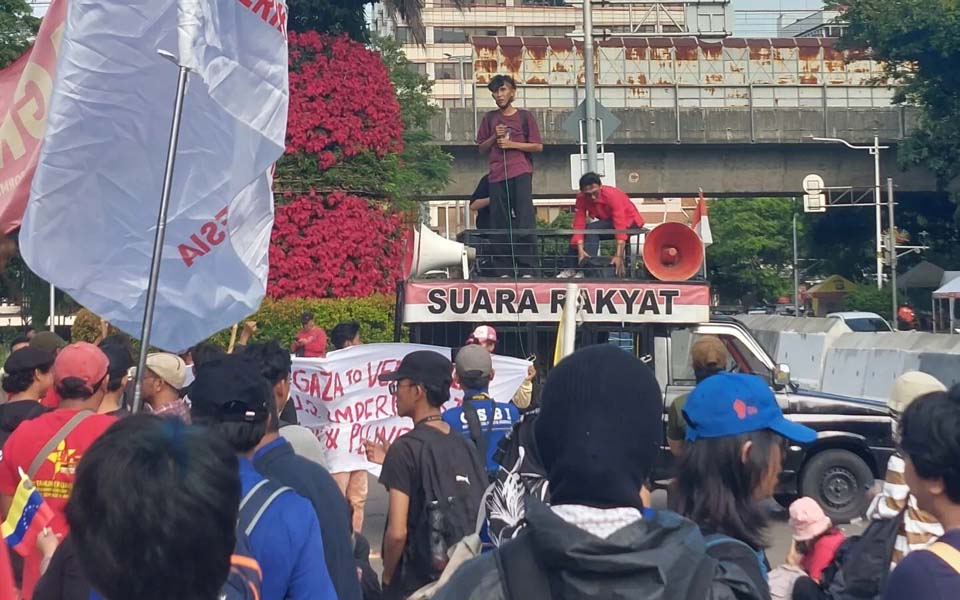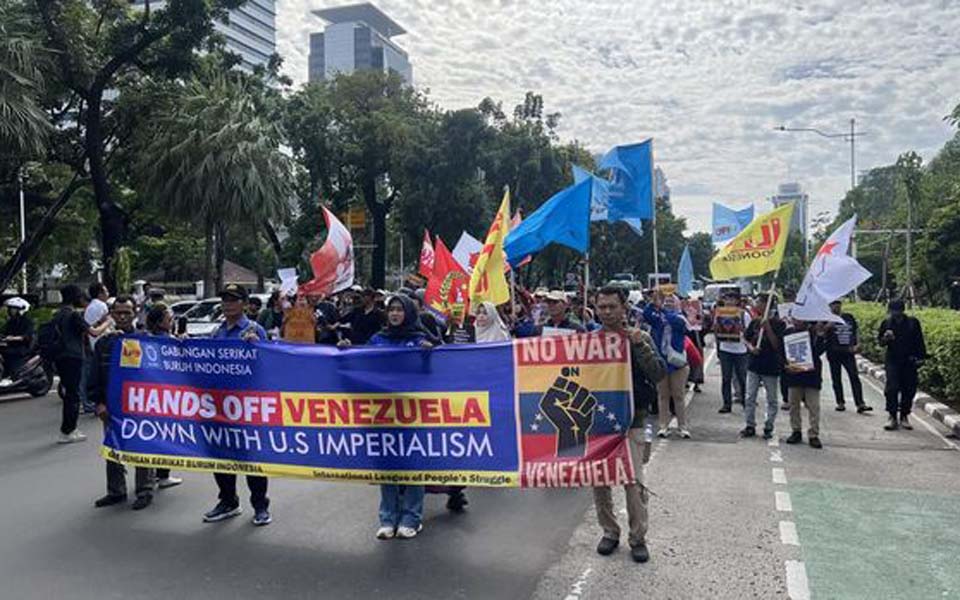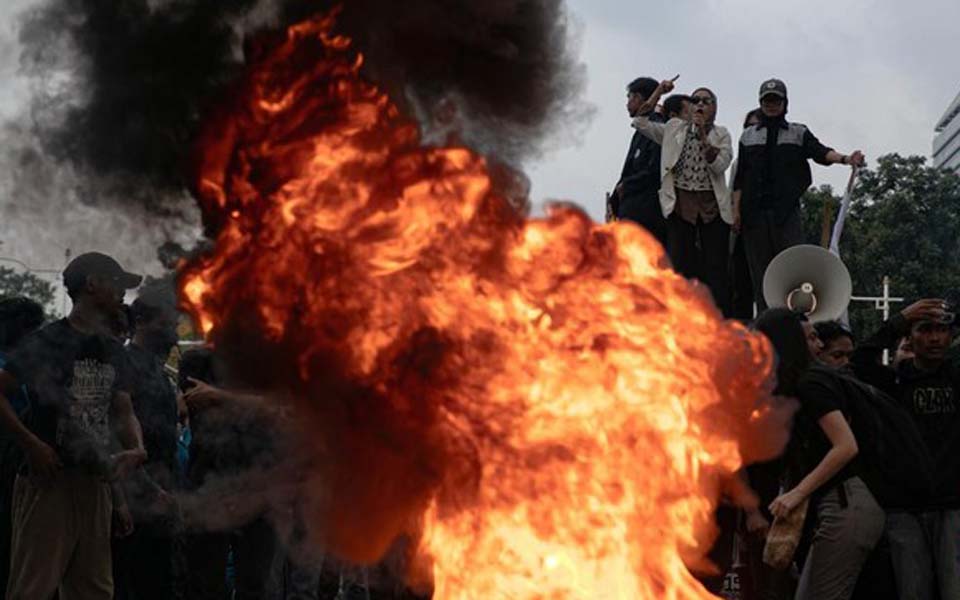Hidayat Salam – Amidst the momentum of the commemoration of Youth Pledge Day on Tuesday October 28, dozens of Indonesian citizens from Indonesia Bergerak (Indonesia Moving), ranging from students to the diaspora, visited the Republic of Indonesia Consulate General (KJRI) in Melbourne, Australia, where the "Indonesia Bergerak Declaration" document was handed over to Consulate staff.
And it was not just in Melbourne, similar movements were organised by the Indonesian diaspora and students in 43 cities across 23 countries.
Specifically in Melbourne, before the "Indonesia Bergerak Declaration" document was read out and submitted to representatives of the Indonesian Consulate General in Melbourne to be forwarding to the Indonesian government, they held a protest action. The participants, who came from various academic backgrounds, took turns giving speeches during the demonstration, which lasted approximately three hours, from 1 pm to 4 pm local time.
Pipin Jamson, a doctoral student at the University of Melbourne, shared her views on the Indonesia Bergerak Declaration and the collective work of the Indonesia Bergerak International Committee that initiated it with participants at the action.
Another participant, Jesslyn Giovanni, a doctoral student at the University of Melbourne, shared her views on the crucial role of intellectuals in nation-building. She emphasised the moral responsibility of academics to safeguard public reason.
There was also a speech from Aero Zeta, an undergraduate student in Melbourne, who emphasised the important role of young people in articulating the aspirations of the people.
So, what is the content of "Indonesian Bergerak Declaration"?
"The Indonesia Bergerak Declaration focuses on seven points, primarily on re-establishing the people's sovereignty that has been usurped by powers that are corrupt, by militarism and an extractive economy that has destroyed the environment and brought misery to communities", said Ucu Martanto, a student in Melbourne who took part in the demonstration when contacted by Kompas from Jakarta on Tuesday.
According to Ucu, this declaration does not contain a list of their demands on the Indonesian government, but rather a call to all Indonesian people to unite, take action and reorganise Indonesia. They hopes that through this declaration they can bridge the gap between today's conditions and the future of a nation that is truly independent, democratic, prosperous, equal and just.
Indonesia Bergerak also called on all elements of society to realise Indonesia's ideals of becoming a nation that is civilised, humane, democratic, free from corruption, collusion and nepotism (KKN) as well as prosperous and just economically, socially and ecologically.
"These calls are more directed at society, to reclaim our sovereignty", said Ucu.
Aside from Melbourne, the Indonesia Bergerak Declaration was also delivered by Indonesian citizens in several other countries that are bases for the Indonesia Bergerak International Committee. This movement of the diaspora and students abroad has spread to 43 cities in 23 countries, not only in Australia but also in Asia, the United States and Europe.
Same anxieties
According to Ucu, the movement arose from same anxieties felt by students and the diaspora abroad.
The anxieties referred began with the "Indonesia Darurat" (Indonesia Emergency) demonstrations in August 2024. The unrest and the movement escalated during the "Indonesia Gelap (Dark Indonesia) demonstrations from February to March 2025. Furthermore, the movement multiplied during the call to "Reset Indonesia" protests from August to September 2025.
According to Pipin, the movement was inspired by the youth movement in the Indonesian Association (Perhimpunan Indonesia) in 1928. At that time, they were exposed to ideas about anti-colonialism and nationalism while abroad.
Although the current context is different (no longer fighting colonialism), Indonesia is not yet 100 percent free from oppression, ignorance and oligarchic intervention. Therefore, to resist the oligarchy and the practices of the New Order regime of former president Suharto that are seen as still remaining, systematic and sustained efforts are needed.
From Melbourne, the movement reached out to other diasporas in the Australian cities of Canberra and Perth. It then spread to the United Kingdom, the United States, Germany and Canada. The Indonesia Bergerak International Committee was then formed. Through this movement, the diaspora sought to maintain a connection with their homeland.
"We are following all the developments in Indonesia, which are becoming increasingly disturbing day by day", she said.
With committee members spread across various cities and countries, it was not an easy task to consolidate the movement until it finally produced the declaration.
Moreover, according to Pipin, frequent "attacks" occur to try to undermine the movement. These attacks include hacking personal or collective social media accounts.
The attacks usually occur after Indonesia Bergerak voices major issues, especially those concerning the Indonesian Military (TNI) and the National Police (Polri), such as the opposition to revisions of the TNI Law earlier this year.
"The case of my personal account being taken over, and it also happened to friends in America. Most recently, in October, three collective accounts – Germany Bergerak, South Korea Bergerak and Tokyo Bergerak – were also hacked at the same time", said Pipin.
Not only that, Pipin recounted the time when students and workers who were members of Germany Bergerak were suddenly contacted by the local Indonesian attache during the Indonesia Gelap actions in February 2025. Pipin also explained that the geopolitical context in each country also influences their freedom of movement.
"In Malaysia or Taiwan, for example, local governments imposed restrictions. There are also Indonesian Consulate Generals who are more sensitive to such actions", she said.
Nevertheless, this has actually further crystallised the solidarity of the members of the Indonesia Bergerak International Committee until finally the Indonesia Bergerak Declaration was drawn up.
100 years since the Youth Pledge
Ucu added that the drafting of the declaration was able to be done through intensive consolidation, even involving activists and academics at home. The involvement of activists was considered important to calibrate the concerns of the diaspora with the real demands being articulated by the ordinary people in Indonesia.
After the draft was finalised, the they held the First Indonesia Bergerak Congress on October 26. The online congress, which lasted over three hours, was attended by more than 100 participants, including members of Indonesia Bergerak and elements of society at home, such as labour and pro-democracy activists, student organisations from campuses and environmental activists.
During the congress, they discussed a draft of the declaration by gathering input from congress participants. The declaration was then distributed to various countries serving as a bases for the Indonesia Bergerak International Committee.
Pipin emphasised that the peaceful demonstration in Melbourne was not the end, but rather the beginning of a long journey. Her group has begun developing a long-term roadmap, including commemorating the 100th anniversary of the Youth Pledge in 2028.
"Our roadmap is towards the 100th anniversary of the Youth Pledge. So, this declaration won't be read out just once", said Pipin.
Drafting a manifesto
The next step is to draft a manifesto, a document that analyses the roots of the nation's problems in greater depth and emphasises the political position of their movement.
They will also continue to voice crucial domestic issues that cannot be postponed, such as demands for the release of activists who are still missing or detained by police. Furthermore, an ongoing consolidation will be carried out. This is deemed crucial to maintain communication and collaboration with various elements in Indonesia, from activists, workers, students to marginalised groups, to build an organised people's movement.
Ucu emphasised that this declaration is expected to serve as a call to action for the Indonesian people to start taking action. "We hope that the people of Indonesia can then speak out together to reclaim sovereignty in whatever issues", he said.
A necessary movement
Jentera Indonesian College of Law (Jentera STH) lecturer Bivitri Susanti said she appreciates the Indonesia Bergerak movement initiated by the diaspora and students abroad. This movement also validates that the problems experienced by the Indonesian people are indeed major national issues, not just the dissatisfaction of some people in the country, but also of the diaspora.
"Usually, indeed people who are far from home have a different perspective and can contribute well to our thoughts about our nation and country", she said.
However, Bivitri emphasised the importance of not placing the burden on movements that they must "either be able or not be able to drive" change directly. Their role should be viewed from a more fundamental perspective.
"First, the movement is an expression of criticism that must be expressed, conveyed. 'Indonesianists' (Indonesian experts from abroad) are often labelled foreigners, so their views are not taken seriously by those in power. These are people who live outside Indonesia, but they are also WNI [Indonesian citizens]", she said.
The second point that is equally important about this movement, Bivitri continued, is its advocacy role. When civil space at home experiences repression or is narrowing, the diaspora can serve as a megaphone, amplifying voices from within to the international stage.
"Overseas networks are also needed for advocacy when all channels are suppressed in Indonesia. They can disseminate issues at home to the world", she said.
The simultaneous emergence of voices from various countries also demonstrates a shared analysis, or a common reading, that crosses borders. Moreover, those far from home often have differing perspectives that can provide valuable insights into the domestic landscape.
Bivitri hopes that Indonesia Bergerak can continue to consolidate the movement and strengthen its network. "Our hope is that they can build a stronger network so they can participate in bringing Indonesian issues to the international stage", she said.
Notes
On October 28, 1928, Indonesian students and youth gathered in Jakarta to declare the Youth Pledge (Sumpah Pemuda) – generally accepted as the first open declaration of Indonesian independence – which called for a united independent Indonesia under the theme of "One Nation, One People, One Language". It was the first time that a substantial body of anti-colonial activists committed themselves to an independent united nation with Malay as the national language. The event is now marked as National Youth Day every October 28.
[Translated by James Balowski. The original title of the article was "Maklumat Indonesia Bergerak dan Kegelisahan Pemuda".]
Source: https://www.kompas.id/artikel/maklumat-indonesia-bergerak-dan-kegelisahan-pemuda





